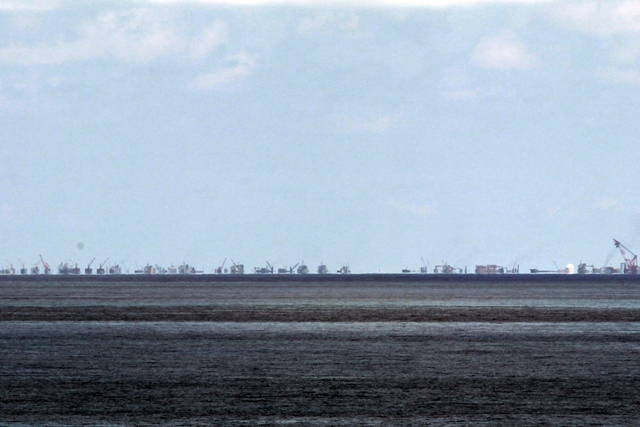China seen to push states to withdraw South China Sea claims

In this Monday, May 11, 2015, file photo, the alleged on-going reclamation of Subi Reef by China is seen from Pag-asa Island in the Spratly Islands in the South China Sea, western Palawan Province, Philippines. China’s campaign of island building in the South China Sea might soon quadruple the number of airstrips available to the People’s Liberation Army in the highly contested and strategically vital region. That could be bad news for other regional contenders, especially the U.S., the Philippines and Vietnam. Ritchie B. Tongo/Pool Photo via AP, File
MANILA, Philippines — Beijing might keep other claimant states away from the South China Sea as it seeks greater control over the region in the long run, maritime security analysts said.
Experts from the Center for Strategic and International Studies said China may have a different goal than when they first started their island-building activities in the South China Sea a few years back.
"We see a much more confident China now than we did just five years ago... My guess is that China wants greater control in the South China Sea, I don’t think that’s surprised anyone," CSIS expert Zack Cooper said in a podcast hosted by the Asia Maritime Transparency Initiative.
Cooper, however, said China might try to exclude other countries from conducting freedom of navigation and overflight in the region as that would pose a threat to Beijing's trade in the region.
Over the long term, Beijing might use its artificial islands, which have been installed with military facilities, in the Spratlys and Paracels to "press other countries out of the region."
"I wouldn’t be shocked at all if we see China trying to stop fishing in portions of the South China Sea or pushing other claimants off of their claims in the region... I think we have to expect that if China grows stronger that is quite likely to have much more expansive aims that it has now," Cooper said.
'China will expect countries to advance its interests'
Agreeing with Cooper, CSIS expert Bonnie Glaser said that China's policies will be driven by their capabilities and how other countries see them.
"The Chinese, I think, want every country in the region to avoid taking steps that would take Chinese interests and maybe in the future that will progress to a point where China will expect countries to implement some policies in order to help, expand and advance Chinese interests," Glaser said in the podcast.
Glaser also expressed concern over the remarks of Chinese President Xi Jinping at the National Congress of the Communist Party of China last October, where he highlighted the "steady progress" of construction in the disputed waters.
"'Steady progress' in Chinese, as well as in English and other languages, implies to me that China has not yet achieved its goal, that it’s continuing down this path it is making gains and it is going to continue to work on ways to advance its objective," Glaser said.
She added that Beijing's goals in the future might include establishing an Air Defense Identification Zone and maybe even dredging in the South China Sea.
Other countries might 'give in' like Philippines did
Cooper, on the other hand, warned that other claimant states might readily give up their claims when faced with China's overwhelming strength given its maritime militia.
"We'll see other countries in the region do what... the Philippines has done which is try and think through... if they're gonna lose some of these claims anyway, maybe they can get something for it," Cooper said.
One tactic for Beijing would be paying a certain amount or offering assistance to smaller claimant states to the point that they would withdraw from their claims.
"I think that’s a real danger unless we can stop the momentum that we’ve seen in the last few years," Cooper added.
AMTI director Gregory Poling, meanwhile, noted that tensions in the disputed South China Sea have cooled down since the election of President Rodrigo Duterte and US President Donald Trump.
'Win-win' and delaying tactics
The Chinese have resorted to two possible strategies — reaching out diplomatically to Southeast Asian nations to reach a "win-win" solution or employing delaying tactics such as the negotiations in on the Code of Conduct in the South China Sea.
"The continued construction, for instance, the military facilities in the Spratlys implies that China has an access to change anything about its fundamental goals. All it's doing is tactically reaching out in the hopes that it has in fact suggested to some Southeast Asians on the side to cut and run, which is true," Poling said.
Despite insisting that they will not give up a single inch of the country's territory, the Philippine government appears to be doing otherwise.
Following reports that China had transformed Fiery Cross or Kagitingin Reef into a fortified airbase, presidential spokesperson Harry Roque said that the government continues to rely on Beijing's commitment of "good faith" that they will not embark on new reclamation activities.
"From the very beginning China, we knew, was militarizing the area by reclaiming these areas and by using them as military bases so the fact that they are actually using it now as military bases, as far as I am concerned, is not new," Roque said in a televised press briefing.
RELATED: Palace defends China's 'good faith' in South China Sea
- Latest
- Trending





























